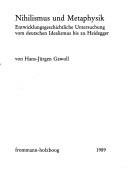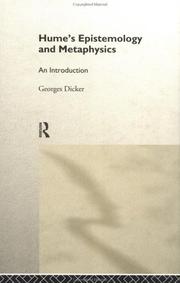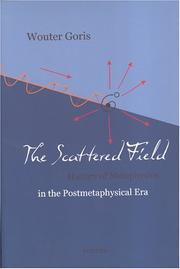| Listing 1 - 10 of 62 | << page >> |
Sort by
|
Book
ISBN: 9780415855655 9781135007713 9781135007690 9780415855662 0415855659 Year: 2017 Publisher: London Routledge
Abstract | Keywords | Export | Availability | Bookmark
 Loading...
Loading...Choose an application
- Reference Manager
- EndNote
- RefWorks (Direct export to RefWorks)
This book showcases a range of views on topics at the forefront of current controversies in the field of metaphysics. It will give readers a varied and alive introduction to the field, and cover such key issues as: modality, fundamentality, composition, the object/property distinction, and indeterminacy. The contributors include some of the most important philosophers currently writing on these issues. The questions and philosophers are: Are there any individuals at the fundamental level? / (1) Shamik Dasgupta (2) Jason Turner. Is there an objective difference between essential and accidental properties? / (1) Meghan Sullivan (2) Kris McDaniel and Steve Steward. Are there any worldly states of affairs? / (1) Daniel Nolan (2) Joseph Melia. Are there any intermediate states of affairs? / (1) Jessica Wilson (2) Elizabeth Barnes and Ross Cameron. Do ordinary objects exist? / (1) Trenton Merricks (2) Helen Beebee
Metaphysics --- History --- Metaphysics - History
Book
ISBN: 9780198755722 0198755724 0191816876 Year: 2016 Publisher: Oxford Oxford University Press
Abstract | Keywords | Export | Availability | Bookmark
 Loading...
Loading...Choose an application
- Reference Manager
- EndNote
- RefWorks (Direct export to RefWorks)
What makes up reality, and how? What kinds of entity are fundamental to reality, and how do dependent entities depend on the fundamental ones? How does one entity metaphysically ground another? These questions are central to contemporary metaphysics. The papers in this collection, written by a new generation of metaphysicians, address these and related questions. They investigate the metaphysical concepts of grounding and fundamentality, and the relationship between the fundamental and all the other parts of reality. Together, these papers represent the cutting-edge of a central topic in contemporary metaphysics.
Metaphysics --- Reality --- History --- Philosophy --- Metaphysics - History - Philosophy
Book
ISSN: 1384668X ISBN: 9789027214676 9027214670 9789027266927 9027266921 Year: 2016 Volume: Band 57 Publisher: Philadelphia
Abstract | Keywords | Export | Availability | Bookmark
 Loading...
Loading...Choose an application
- Reference Manager
- EndNote
- RefWorks (Direct export to RefWorks)
Die Philosophie des Barockscotismus war einerseits durch die rückwärtsgewandte Anknüpfung an den mittelalterlichen Denker Johannes Duns Scotus, andererseits durch die Anknüpfung an die Entwicklung in der zeitgenössischen Scholastik, vor allem der Jesuitenscholastik, geprägt. Welche Art von Metaphysik hat diese besondere philosophiehistorische Konstellation hervorgebracht? Um diese Frage zu beantworten, analysiert die vorliegende Arbeit das Metaphysikwerk des wichtigsten Repräsentanten des frühneuzeitlichen Scotismus, Bartholomaeus Mastrius (1602-1673); sie erschließt außerdem eine Vielzahl von kaum bis gar nicht erforschten Metaphysikwerken aus der Franziskanerscholastik des 17. und 18. Jahrhunderts. Das eigenartige, erstaunliche Vielfalt einschließende Profil einer in Vergessenheit geratenen philosophischen Tradition wird deutlich. Durch den Fokus auf ein philosophiehistorisches Phänomen außerhalb des Mainstreams leistet die Arbeit einen Beitrag zu einer differenzierteren Sichtweise der intellektuellen Kultur der europäischen Frühmoderne. Baroque-age Scotist philosophy was, on the one hand, characterised by recourse to the Medieval thinker John Duns Scotus and, on the other hand, by an adaptation to trends in contemporary scholasticism, first of all that of the Jesuits. What kind of metaphysics did this particular constellation within the history of philosophy produce? In order to answer this question, the present book analyses the work on metaphysics by the most important representative of early modern Scotism, Bartolomeo Mastri (1602-1673). In addition, the book investigates a multitude of scarcely or never studied works on metaphysics from the Franciscan scholastic tradition of the 17th and 18th centuries. The peculiar profile of a forgotten philosophical tradition with its astonishing plurality becomes apparent. By focusing on a phenomenon from the history of philosophy outside the mainstream, this work contributes to a more differentiated view on the intellectual culture in early modern Europe.
Metaphysics --- History --- Mastri, Bartolomeo, --- Metaphysics - History --- Mastri, Bartolomeo, - 1602-1673
Book
ISBN: 9780199693092 0199693099 9786612348839 1282348833 0191570621 019956664X 0191722030 Year: 2011 Publisher: Oxford : Oxford University Press,
Abstract | Keywords | Export | Availability | Bookmark
 Loading...
Loading...Choose an application
- Reference Manager
- EndNote
- RefWorks (Direct export to RefWorks)
Daniel Garber presents an illuminating study of Leibniz's conception of the physical world. Leibniz's commentators usually begin with monads, mind-like simple substances, the ultimate building-blocks of the Monadology. But Leibniz's apparently idealist metaphysics is very puzzling: how can any sensible person think that the world is made up of tiny minds? In this book, Garber tries to make Leibniz's thought intelligible by focusing instead on his notion of body. Beginning with Leibniz's earliest writings, he shows how Leibniz starts as a Hobbesian with a robust sense of the physical world, and how, step by step, he advances to the monadological metaphysics of his later years. Much of the book's focus is on Leibniz's middle years, where the fundamental constituents of the world are corporeal substances, unities of matter and form understood on the model of animals. For Garber monads only enter fairly late in Leibniz's career, and when they enter, he argues, they do not displace bodies but complement them. In the end, though, Garber argues that Leibniz never works out the relation between the world of monads and the world of bodies to his own satisfaction: at the time of his death, his philosophy is still a work in progress.
Monadology. --- Leibniz, Gottfried Wilhelm, --- Monadology --- Metaphysics --- History --- Metaphysics - History --- Leibniz, Gottfried Wilhelm, - Freiherr von, - 1646-1716
Book
ISBN: 9780199674480 9780199567911 0199567913 0191725447 0199674485 129920189X 0191501794 9780191501791 Year: 2011 Publisher: Oxford Clarendon
Abstract | Keywords | Export | Availability | Bookmark
 Loading...
Loading...Choose an application
- Reference Manager
- EndNote
- RefWorks (Direct export to RefWorks)
Robert Pasnau tells a continuous story about the development of philosophy from the late Middle Ages into the early modern era of the 17th century. The focus is questions in metaphysics concerning the nature of matter and the structure of the material world.
Metaphysics --- Substance (Philosophy) --- Métaphysique --- Substance (Philosophie) --- History. --- Histoire --- History --- Metaphysics - History --- Philosophy
Book
ISBN: 9781119693666 1118957792 1119693667 1118957784 Year: 2021 Publisher: Chichester Wiley Blackwell
Abstract | Keywords | Export | Availability | Bookmark
 Loading...
Loading...Choose an application
- Reference Manager
- EndNote
- RefWorks (Direct export to RefWorks)
"The first focused study of Nietzsche's Dawn, offering a close reading of the text by two of the leading scholars on the philosophy of Nietzsche. Published in 1881, Dawn: Thoughts on the Presumptions of Morality represents a significant moment in the development of Nietzsche's philosophy and his break with German philosophic thought. Though groundbreaking in many ways, Dawn remains the least studied of Nietzsche's work. In Nietzsche's Dawn: Philosophy, Ethics, and the Passion of Knowledge, authors Keith Ansell-Pearson and Rebecca Bamfordpresent a thorough treatment of the second of Nietzsche's so-called 'free spirit' trilogy."--Publisher's website.
Book
ISBN: 0691073597 Year: 1989 Publisher: Princeton, N.J. Princeton University Press
Abstract | Keywords | Export | Availability | Bookmark
 Loading...
Loading...Choose an application
- Reference Manager
- EndNote
- RefWorks (Direct export to RefWorks)

ISBN: 3772809960 9783772809965 Year: 1989 Volume: 9 Publisher: Stuttgart-Bad Cannstatt Frommann-Holzboog
Abstract | Keywords | Export | Availability | Bookmark
 Loading...
Loading...Choose an application
- Reference Manager
- EndNote
- RefWorks (Direct export to RefWorks)
Metaphysics --- anno 1800-1999 --- Germany --- Nihilism (Philosophy) --- Philosophy, German --- History. --- History --- Nihilism (Philosophy) - History. --- Metaphysics - History. --- Philosophy, German - History. --- Metaphysics. --- Métaphysique. --- Nihilism (Philosophy). --- Nihilisme. --- Nihilismus. --- metaphysics. --- nihilism.

ISBN: 0415163196 0415163188 9780415163187 9780415163194 Year: 1998 Publisher: London Routledge
Abstract | Keywords | Export | Availability | Bookmark
 Loading...
Loading...Choose an application
- Reference Manager
- EndNote
- RefWorks (Direct export to RefWorks)
Hume, David --- Knowledge, Theory of --- Metaphysics --- History --- Hume, David, --- Knowledge, Theory of - History - 18th century --- Metaphysics - History - 18th century --- Hume, David, - 1711-1776

ISBN: 9042914874 9789042914872 Year: 2004 Publisher: Leuven Dudley, Ma Peeters
Abstract | Keywords | Export | Availability | Bookmark
 Loading...
Loading...Choose an application
- Reference Manager
- EndNote
- RefWorks (Direct export to RefWorks)
Filosofie van de Middeleeuwen --- Metafysica --- Métaphysique --- Philosophie du Moyen Age --- Metaphysics --- Philosophy, Medieval. --- History. --- Philosophy, Medieval --- Medieval philosophy --- History --- Scholasticism --- Metaphysics - History.
| Listing 1 - 10 of 62 | << page >> |
Sort by
|

 Search
Search Feedback
Feedback About UniCat
About UniCat  Help
Help News
News